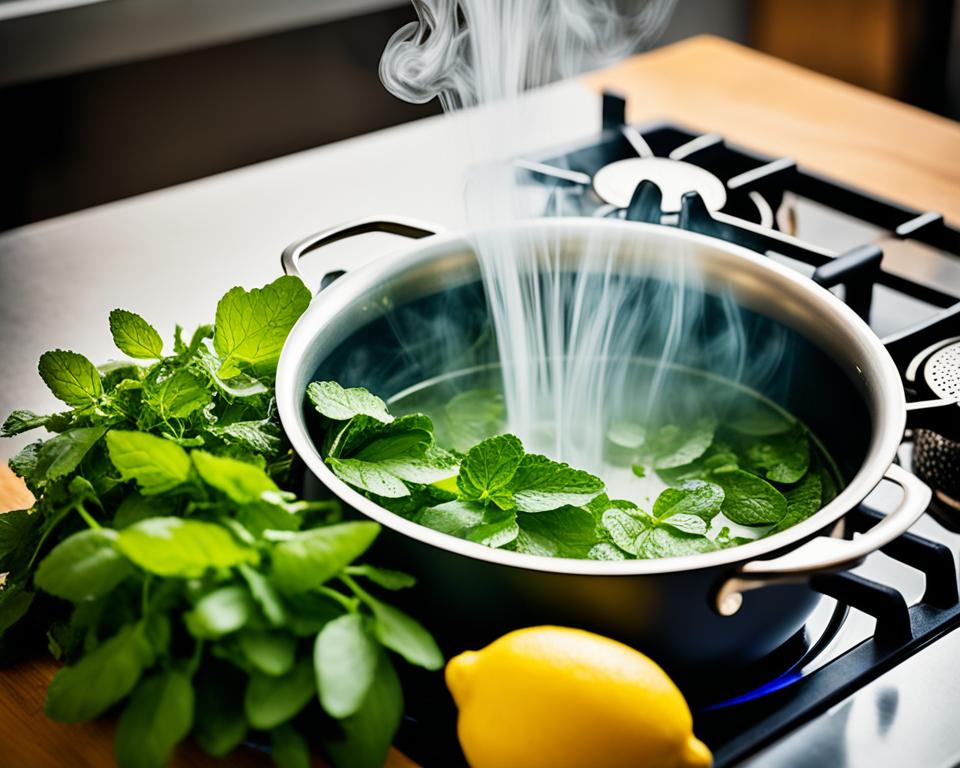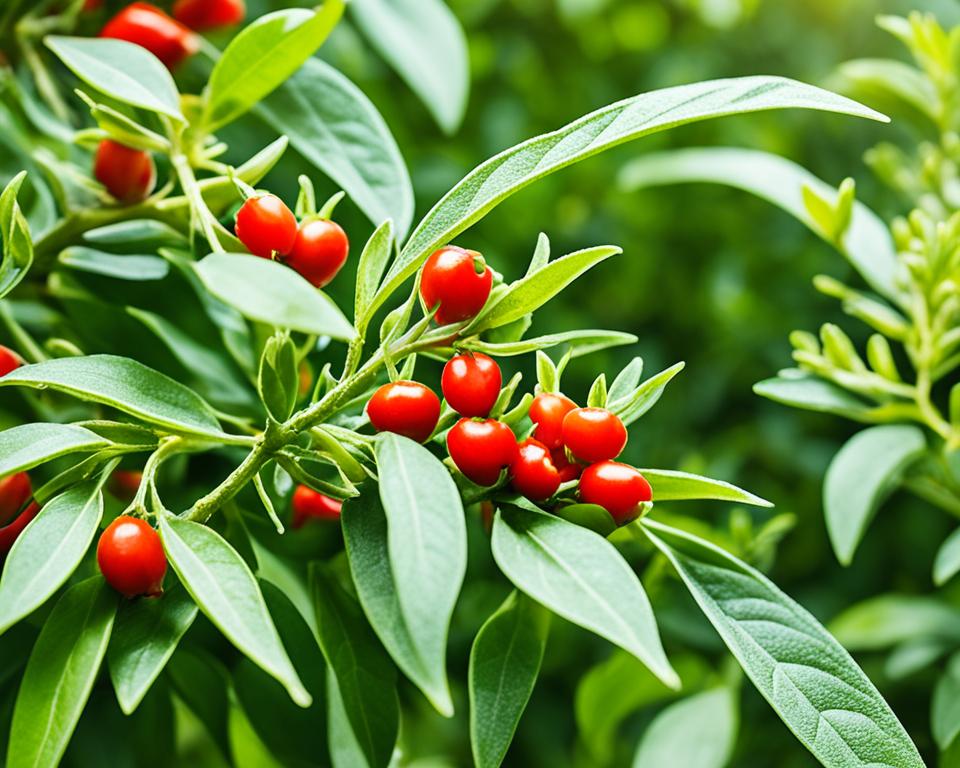Lemon balm, scientifically known as Melissa officinalis, is a versatile herb belonging to the Lamiaceae (mint) family. This perennial plant is renowned for its calming properties and a wide range of potential health benefits. With a mild lemon-like aroma and flavor, lemon balm has been used for centuries in traditional herbal medicine to promote relaxation, alleviate anxiety, and improve sleep quality. In this comprehensive article, we will explore the botanical profile, active compounds, and the various ways in which lemon balm can be utilized as a natural remedy and wellness supplement.
Read interesting things at : tosawakan
Key Takeaways
- Lemon balm is a versatile herb known for its calming and soothing properties.
- The herb has been used for centuries in traditional herbal medicine to promote relaxation and alleviate anxiety.
- Lemon balm contains active compounds like volatile oils, phenolic compounds, and terpenoids that contribute to its potential health benefits.
- In addition to its anti-anxiety effects, lemon balm may also support sleep, digestive health, and cognitive function.
- Lemon balm can be consumed as a tea, tincture, or extract, and can also be used in aromatherapy and culinary applications.
What is Lemon Balm?
Lemon balm, or Melissa officinalis, is a perennial herb native to the Mediterranean region and parts of Western Asia. It is known for its distinct lemon-like aroma and flavor, which is derived from the plant’s essential oils. The botanical profile of lemon balm includes its membership in the Lamiaceae family, which also includes other aromatic herbs like mint, rosemary, and lavender.
Plant Characteristics
Lemon balm is a bushy, herbaceous plant that can grow up to two feet tall. Its leaves are soft, green, and heart-shaped, with a slightly hairy texture. The plant produces small, white or pale pink flowers that bloom in the summer months. When the leaves or stems of the lemon balm plant are bruised or crushed, they release a refreshing, lemony scent.
Historical Uses
Lemon balm has a long history of use in traditional herbal medicine practices around the world. In ancient Greece, the herb was revered for its calming and digestive properties, and was often used to soothe anxiety and improve mood. In traditional Iranian medicine, Melissa officinalis was recommended for a variety of ailments, including insomnia, gastrointestinal issues, and even memory enhancement.
Lemon Balm
Lemon balm, or Melissa officinalis, is known for its diverse array of active compounds that contribute to its medicinal properties. These active constituents include volatile oils, phenolic compounds, and terpenoids.
Active Compounds
The primary volatile oils present in lemon balm are citronellal, geranial, and neral, which are responsible for the herb’s distinct lemon-like aroma. Additionally, phenolic compounds such as rosmarinic acid, caffeic acid, and flavonoids like luteolin and quercetin have been identified as potential bioactive agents that may be responsible for lemon balm’s medicinal benefits.
Cultivation and Harvesting
Lemon balm is a relatively easy-to-grow herb that can thrive in a variety of growing conditions. It prefers well-drained, moist soil and partial shade to full sun exposure. The plant can be propagated through cuttings or division and requires regular maintenance, such as pruning and watering, to ensure optimal growth and yield. Typically, the leaves of lemon balm are harvested before the plant flowers, as this is when the concentration of active compounds is at its highest.
Anti-Anxiety Properties
One of the primary uses of lemon balm is its ability to promote calm and relaxation, making it a popular natural remedy for anxiety and stress relief. Studies have shown that lemon balm’s active compounds, such as rosmarinic acid and volatile oils, can have a calming effect on the nervous system. These compounds may interact with GABA receptors in the brain, which are responsible for regulating mood and reducing neurological excitability.
Calming Effects on the Nervous System
The calming effects of lemon balm can be attributed to its ability to modulate the activity of the neurotransmitter gamma-aminobutyric acid (GABA) in the brain. GABA plays a crucial role in inhibiting neuronal excitability, which can help alleviate feelings of anxiety and promote a sense of relaxation. By interacting with GABA receptors, the active compounds in lemon balm may enhance the brain’s natural ability to regulate mood and reduce stress-induced neurological responses.
Reducing Stress and Promoting Relaxation
In addition to its calming effects on the nervous system, lemon balm has also been shown to possess stress-reducing properties. The plant’s aromatic compounds, such as citronellal and geranial, may have a soothing and relaxing effect when inhaled or applied topically. This can contribute to an overall sense of well-being and help individuals better manage the physiological and psychological symptoms of stress.
Sleep-Promoting Benefits
In addition to its anti-anxiety properties, lemon balm has also been studied for its potential to improve sleep quality and duration. The calming effects of lemon balm’s active compounds, such as rosmarinic acid and the volatile oils, may help to reduce the time it takes to fall asleep and increase the overall quality of sleep.
Natural Sleep Aid
Numerous studies have suggested that lemon balm can be an effective natural sleep aid. The herb’s ability to promote relaxation and reduce stress may be particularly beneficial for individuals struggling with insomnia or poor sleep patterns. By calming the nervous system and modulating neurotransmitter activity, lemon balm may help to facilitate the transition to a more restful and restorative sleep.
In addition to its direct effects on sleep, lemon balm may also enhance the overall quality of sleep by reducing the occurrence of disruptive factors such as anxiety, stress, and digestive issues. By addressing the underlying causes of sleep disturbances, lemon balm can potentially lead to more consistent and rejuvenating sleep cycles.
Overall, the sleep-promoting benefits of lemon balm make it a valuable natural sleep aid for those seeking a gentle and effective alternative to traditional sleep medications. Its ability to promote relaxation and improve sleep quality can contribute to overall improved health and well-being.
Digestive Health
Lemon balm has a long history of use in traditional herbal medicine for supporting digestive health. The herb’s active compounds, such as rosmarinic acid and terpenes, may have a soothing effect on the gastrointestinal tract and help to alleviate various digestive issues.
Supporting Gut Health
Emerging research suggests that lemon balm may possess beneficial properties for gut health. The herb’s bioactive compounds may help to modulate the gut microbiome, promoting a healthy balance of gut flora. This, in turn, can contribute to improved digestive function and overall gut wellness.
Relieving Bloating and Gas
Lemon balm has been traditionally used to help alleviate bloating and gas in the digestive system. The herb’s potential anti-spasmodic and carminative properties may help to relax the gastrointestinal muscles, reduce intestinal gas, and promote the healthy elimination of waste products.
Cognitive Function
Emerging research suggests that lemon balm may have beneficial effects on cognitive function, particularly in the areas of memory enhancement and concentration. The active compounds in lemon balm, such as rosmarinic acid and volatile oils, may interact with acetylcholine, a neurotransmitter crucial for healthy cognitive processes.
Enhancing Memory and Concentration
Studies have indicated that lemon balm may have the potential to improve memory and enhance cognitive performance. The herb’s active compounds may help to modulate the activity of acetylcholine, a neurotransmitter involved in various cognitive functions, including memory, attention, and information processing. This mechanism may contribute to lemon balm’s ability to support memory enhancement and improve concentration levels.

In addition, the calming and relaxing effects of lemon balm may also play a role in supporting optimal cognitive function. By reducing stress and promoting a sense of calm, the herb may create an environment conducive to improved focus, learning, and information retention.
Incorporating lemon balm into one’s daily routine, through supplements, teas, or other herbal preparations, may offer a natural and gentle approach to supporting cognitive function, memory, and concentration. As with any herbal remedy, it is essential to consult with a healthcare professional to ensure safe and appropriate use.
Herbal Remedies
Lemon balm, with its versatile properties, can be utilized in various herbal remedies to harness its potential health benefits. One of the most common and accessible ways to consume lemon balm is through the preparation of a soothing and aromatic lemon balm tea. This simple yet effective herbal tea can be brewed from the fresh or dried leaves of the lemon balm plant, offering a mild, lemony flavor and a calming effect that may help promote relaxation and alleviate stress.
Lemon Balm Tea
To prepare lemon balm tea, simply steep a few fresh or dried lemon balm leaves in hot water for 5-10 minutes, allowing the aromatic compounds to infuse into the liquid. The resulting tea can be enjoyed on its own or with a touch of honey or lemon to enhance its naturally soothing qualities.
Tinctures and Extracts
In addition to tea, lemon balm can also be consumed in the form of tinctures and extracts. These herbal preparations concentrate the active compounds of the lemon balm plant, often using an alcohol or glycerin base. Tinctures and extracts offer a more concentrated dose of lemon balm’s therapeutic properties, making them a convenient option for those seeking a more potent herbal remedy.
Essential Oil
The aromatic essence of lemon balm can also be harnessed through the use of lemon balm essential oil. This oil is extracted from the leaves and flowers of the plant and is known for its calming and soothing properties. Lemon balm essential oil can be used in diffusers or applied topically (with proper dilution) to promote relaxation and alleviate feelings of stress and anxiety.
Aromatherapy Uses
In addition to its internal use as a lemon balm herbal remedy, this versatile plant can also be utilized in aromatherapy applications. The plant’s essential oils, which contain compounds like citronellal and geranial, contribute to its distinct lemon-like aroma. When inhaled or diffused, the calming fragrance of lemon balm may help to promote relaxation and alleviate feelings of stress or anxiety.
Calming Fragrance
The aromatic compounds in lemon balm essential oil have been shown to possess soothing and relaxing properties. When used in aromatherapy, the calming fragrance of lemon balm may help to reduce feelings of stress and anxiety, promoting a sense of tranquility and well-being.
Topical Applications
Lemon balm can also be incorporated into topical applications for its potential benefits. The herb’s essential oils and other active compounds may have calming and soothing effects when applied to the skin. Lemon balm-infused lotions, creams, or salves may be helpful for addressing various skin conditions or providing a relaxing sensory experience.
Culinary Applications
Lemon balm’s versatility extends beyond its medicinal and aromatherapeutic uses, as it can also be incorporated into various culinary applications. The herb’s refreshing lemon-like flavor makes it a popular addition to dishes, beverages, and even desserts.
Lemon Balm in Cooking
In the kitchen, lemon balm can be used to add a delicate, citrusy note to a wide range of recipes. The leaves can be finely chopped and incorporated into salads, soups, sauces, and marinades, enhancing the overall flavor profile. Additionally, lemon balm pairs beautifully with seafood, poultry, and even dairy-based dishes, such as cheese plates and desserts.
Herbal Garnishes and Flavoring
Beyond its use in cooked dishes, lemon balm also shines as a culinary garnish. The fresh, vibrant leaves can be used to top off salads, beverages, and even desserts, adding a visually appealing and flavorful touch. Moreover, the herb can be employed as a natural flavoring in a variety of products, including teas, cocktails, and even baked goods.
| Culinary Application | Suggested Uses |
|---|---|
| Salads and Salad Dressings | Chop fresh lemon balm leaves and toss them into green salads or use in homemade vinaigrettes. |
| Soups and Stews | Add lemon balm towards the end of cooking to impart its bright, lemony flavor. |
| Marinades and Sauces | Incorporate lemon balm into marinades for meats, fish, or vegetables, or use it to flavor sauces. |
| Beverages | Steep lemon balm leaves in hot water to make a refreshing herbal tea, or use the leaves to infuse cocktails and lemonades. |
| Baked Goods | Add lemon balm to cakes, cookies, or scones for a delightful citrus twist. |

Safety and Precautions
While lemon balm is generally considered a safe and well-tolerated herb, it’s essential to be aware of potential side effects and interactions with medications. In some individuals, lemon balm may cause mild gastrointestinal discomfort, such as nausea, vomiting, or diarrhea. Allergic reactions, although rare, have also been reported in some cases.
Potential Side Effects
The majority of people who consume lemon balm in recommended doses experience few to no side effects. However, some individuals may react adversely to the herb, particularly those with sensitive digestive systems. Reported side effects of lemon balm may include mild stomach upset, bloating, and in rare cases, allergic skin reactions.
Interactions with Medications
It’s important to exercise caution when using lemon balm alongside certain medications, as it may interact with some pharmaceutical drugs. Lemon balm may potentially interact with thyroid medications, sedatives, and diabetic medications, potentially altering their effectiveness or causing adverse reactions. Individuals taking any prescription medications should consult with a healthcare professional before incorporating lemon balm into their regimen.
Growing Lemon Balm
Lemon balm, or Melissa officinalis, is a versatile herb that thrives in a variety of growing conditions, making it an excellent choice for both home gardens and commercial cultivation. Its ability to adapt to different environments is a testament to its hardiness and resilience.
Ideal Growing Conditions
Lemon balm prefers well-drained, moist soil and a pH range of 6.0 to 7.5. The plant can tolerate a variety of soil types, from sandy to clay-based, as long as the soil is well-aerated and provides adequate drainage. Lemon balm thrives in partial shade to full sun conditions, typically requiring 6-8 hours of direct sunlight per day.
Propagation and Maintenance
Lemon balm can be easily propagated through division, cuttings, or seed sowing. When growing from seed, the seeds should be planted in the spring and kept consistently moist until germination, which typically occurs within 14-21 days. To propagate through division or cuttings, simply take healthy sections of the plant and transplant them to a new location.
Regarding maintenance, lemon balm requires regular pruning to maintain its shape and promote bushy growth. Deadheading spent flowers can encourage further bloom production. Additionally, the plant benefits from a layer of organic mulch around the base to retain soil moisture and suppress weed growth.
Melissa officinalis in Herbal Medicine
Lemon balm, or Melissa officinalis, has a long history of use in traditional herbal medicine practices around the world. In ancient Greece, the herb was revered for its calming and digestive properties, and was often used to soothe anxiety and improve mood. In traditional Iranian medicine, lemon balm was recommended for a variety of ailments, including insomnia, gastrointestinal issues, and even memory enhancement.
Traditional Use in Different Cultures
The use of Melissa officinalis as a medicinal herb can be traced back to ancient times. In the Middle East, the plant was highly regarded for its therapeutic benefits and was incorporated into various traditional remedies. Similarly, in Europe, lemon balm has been used for centuries to promote relaxation, aid digestion, and alleviate stress-related conditions.
Modern Scientific Research
In recent years, the traditional uses of lemon balm have been supported by a growing body of scientific research. Numerous studies have investigated the potential health benefits of Melissa officinalis, confirming its efficacy as a natural remedy for conditions such as anxiety, insomnia, and cognitive enhancement. Researchers have identified the active compounds in the herb, such as rosmarinic acid and volatile oils, which may contribute to its therapeutic properties.










